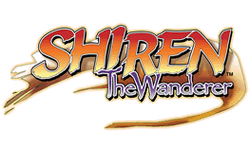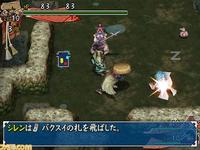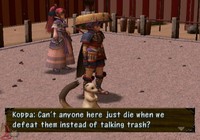|
|

|
PLATFORM
|
Wii
|
BATTLE SYSTEM
|

|
INTERACTION
|

|
ORIGINALITY
|

|
STORY
|

|
MUSIC & SOUND
|

|
VISUALS
|

|
CHALLENGE
|
Unbalanced
|
COMPLETION TIME
|
20-40 Hours
|
|
OVERALL

|
+ Creative setpieces in the ending cutscenes
- Awkward controls and menus
- Larger emphasis on luck than on strategy
- Low quality presentation
- Randomized shop inventories waste time
- The simple mechanics are boring
|
Click here for scoring definitions
|
|
|
An obscure series in an obscure genre, the Shiren games had been imported and lauded by their fans for well over a decade without seeing a stateside release. When the DS port of the original arrived here in 2008, it was received as a good sign for future entries in the series. But by the time Shiren the Wanderer hit western lands, mysterious dungeon games — or Rogue-likes, Japanese turn-based randomized dungeon-crawler RPGs, or whatever you want to call them — have become fairly common, and have grown away from the archaic feel of the early Rogue copycats to the extent that they stand alone as their own unique type of JRPG. So who will enjoy Shiren the Wanderer, the Dragon Quest of the subgenre that refuses to change and ignores gameplay upgrades that have been implemented in other mysterious dungeon games? Probably those who are already lifelong Shiren fans, and no one else.
For those ignorant of what this type of game entails, the player controls Shiren, a wandering samurai, as he explores a series of dungeons. The layout, enemies, and items available on each floor are generated randomly. If exited and re-entered, a dungeon will be regenerated and hence will never be the same twice. Each time Shiren takes any action, be it using an item, swinging his weapon, or taking a step, every foe in the labyrinth will also take an action, so combat and movement are turn-based. It's like some sicko played The Legend of Zelda in the '80s and thought "This would be so awesome if it wasn't in real time" and slowed everything down. The positive side to this is that it encourages planning and strategy rather than reflexes, but the downside is that Shiren is a very slow game to play.
An entertaining quirk to this type of RPG is that death can come quickly and cruelly. Shiren's gameplay mechanics have built in numerous ways to kill Shiren off through little or no fault of the player. Healing items can miss. Unseen enemies can attack from off-screen. A staircase can dump Shiren into a monster house covered in tiles that disable escape scrolls. Invisible traps can paralyze him. Enemies can destroy items in the inventory. And so on and so on. It creates a fine line for players — death comes cheap and often, and whether or not that qualifies as "fun" largely separates the Shiren fanbase from the rest of the gaming community. When Shiren dies, he keeps his experience level and progress in the game, but loses everything in his inventory, including any precious weapons and rare items. On the easy difficulty Shiren keeps his inventory after death, which is such a huge benefit that it makes the game a snap and begs the question of why you're playing it in the first place.
 When three people are in the party, you'll think it's My Babysitting Coach DS.
When three people are in the party, you'll think it's My Babysitting Coach DS.
|
|
A major drawback in Shiren that places it on the wrong side of the Japanese Rogue-like pecking order is the terrible interface and control system. The game supports several controller options, but none of them feels right. They all have cases where buttons are used for too many things depending on whether you tap them or hold them, and what other buttons you're pressing at the same time. When using the nunchuck, one of the easiest buttons to press has the function of locking Shiren into diagonal-only movement. While this is useful when using the d-pad, it isn't necessary when using an analog stick, and there are more crucial functions to have at your fingertips than diagonal movement; for example, firing projectiles is done uncomfortably with the '1' button. The controls are very similar to Shiren DS, which is not a compliment, and it presents an unnecessarily large learning curve to series newcomers. Chunsoft should have spent some time reimagining the controls for the new system rather than grafting old ones awkwardly onto the Wii.
Interface problems go way past controller issues, though. Shiren must take a partner into dungeons with him, and if either character hits 0 HP, the game is over. The player can control either character with the AI directing the other, or the player can control both simultaneously. This is a major problem. The AI is stupid, and although there are several options for how the AI can behave, it tends to either sprint into danger or hang back and be useless, rarely taking any actions between those extremes. The controls for changing partner settings are awkward, and trying to manually control both slows the game down horribly. Really horribly. It becomes nearly unplayable and should only be done during boss fights and when it's clear the AI is about to set Shiren on a collision course with a game over screen, which is fairly often.
There are several other odd issues. A full screen map is in place at all times, hindering the player's view. Hallways in dungeons are dark, hiding enemies from sight, but if the AI-controlled character can see a monster in a hallway it will not appear on the player's screen. This leads to times where the AI is about to engage with an enemy, but the player does not know it. Shops' inventories are randomized, so if no shop carries a critical item like an escape scroll or healing herbs, the player has to run through a previous dungeon just to refresh their stock and hope the desired item appears this time. This needs to be repeated every time a crucial item doesn't appear, and it is shocking how infrequently healing items are for sale. The interface for navigating the shops, bank, and storage is awkward and unintuitive, and there are little annoyances like being unable to check an item's description when multi-selecting, the inability to sell items directly from storage, and in one case a menu cannot be exited by hitting the cancel button whereas every other menu can. Whether you are fighting in dungeons or just navigating menus, Shiren finds ways to keep your fingers from running on autopilot.
 The humor in this screenshot is supposed to distract you from the bland, undetailed graphics.
The humor in this screenshot is supposed to distract you from the bland, undetailed graphics.
|
|
Despite all these hindrances, the interface problems could be marginally forgiven, but the biggest issue is that Shiren lacks both the strategic thinking and all-around humor that games in this subgenre have always relied on for success. Items are bland and uninteresting, lacking the depth and multiple uses of those in a game like Baroque. Healing items heal. Food decreases hunger. Swords stab things. That's about it. When things are going well and Shiren is easy, the game is boring. When things are going poorly and it's difficult, the game is throw-the-controller-at-the-wall frustrating. There isn't anything in between. Randomized crawlers are usually about entering empty-handed and making do with what the dungeon provides, but Shiren lacks this, requiring the player to purchase and bring in items needed to survive because most of the time necessary items won't spawn. It can take several trips through a dungeon just to find a decent weapon, and escape scrolls and advanced healing items appear less frequently than that.
The setting lacks personality and is another big miss for a game of this type. The Japan-inspired world feels detached and humdrum, and while Muramasa: The Demon Blade had a similar issue, at least it had top-notch visuals and music to distract the player. Some of the art designs and imagery in pre-rendered cutscenes are cool, but the style displayed there isn't brought into the dungeons' templated textures which lack detail and diversity. The music has a few excellent pieces when it tries to be pretty, but most of the soundtrack is phoned-in feudal Japan stock compositions with some repeats from earlier Shiren titles. Atlus USA provides one of its B-level localizations — think The Dark Spire, not Persona 4 — that makes no mistakes and handles everything competently, but also makes no attempt to breathe life into a dull story that pulls too many plot twists, antagonist swaps, and uses of "it's magic" for plot point explanations. The main quest can be completed in under forty hours, depending on luck more than anything else. That unlocks postgame dungeons which are more strategy-based, some of which reset Shiren's level to one and play out like a traditional Shiren game.
Shiren the Wanderer tears the heart and soul out of everything that makes games in this subgenre fun or even bearable, leaving a very basic, uninspired randomized crawler with no personality or bells and whistles, then wraps it into an interface that's awkward at its best, and slow and frustrating at its worst. The one thing that made the Shiren series unique — kicking the player back to the start of the game at level one upon death, hardcore-style — was stripped away, leaving an experience that is only objectively set apart from its peers by how drearily simple and unbalanced it is. Longtime Shiren fans who aren't too offended that levels and progress are maintained after death should still enjoy this title's other mechanics, which are unchanged. Gamers new to the subgenre looking for an entry point should start with the better, more enjoyable, and more entertaining Izuna 2: The Unemployed Ninja Returns or Final Fantasy Fables: Chocobo's Dungeon, and if you find yourself wishing Chocobo provided limited access to healing items, no magic abilities, no job classes, a boring plot, a bland setting, weaker music, muddier visuals, and a horrible interface, then give Shiren the Wanderer a shot.
Review Archives
|









